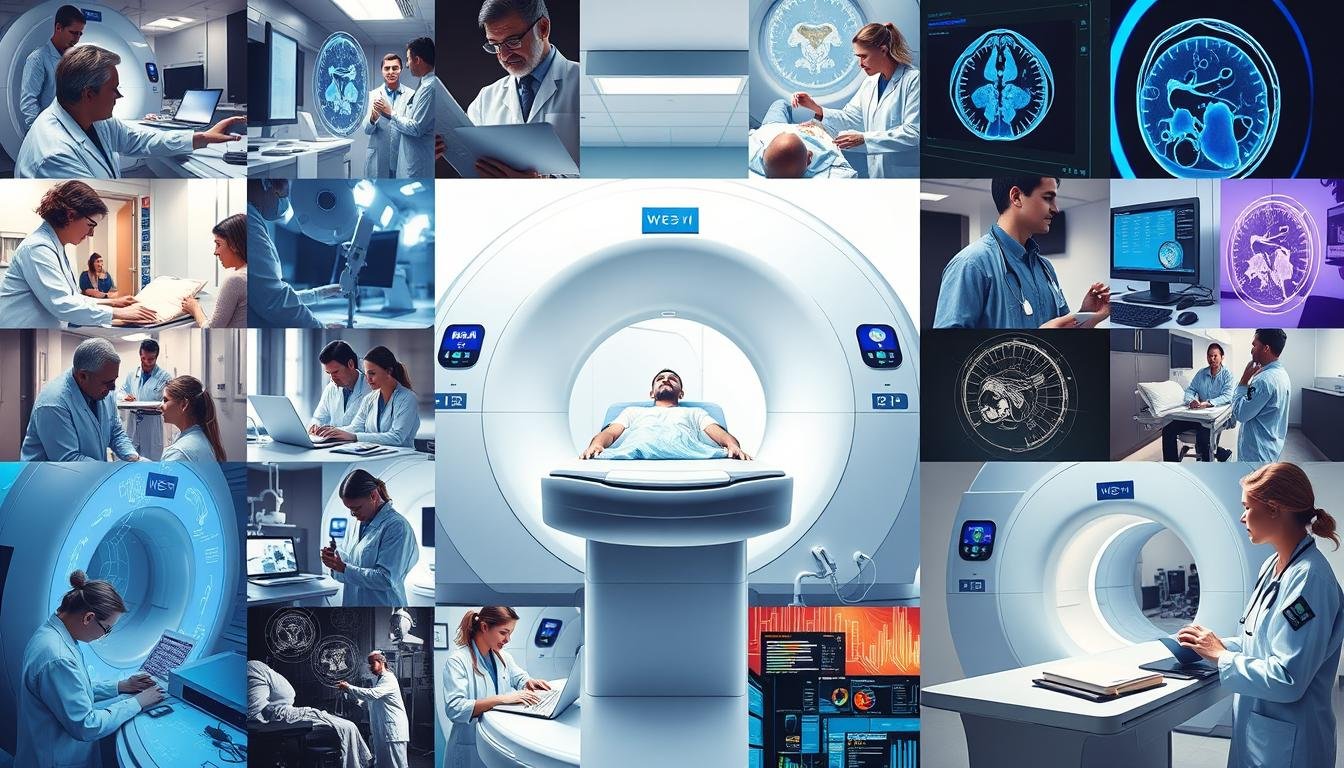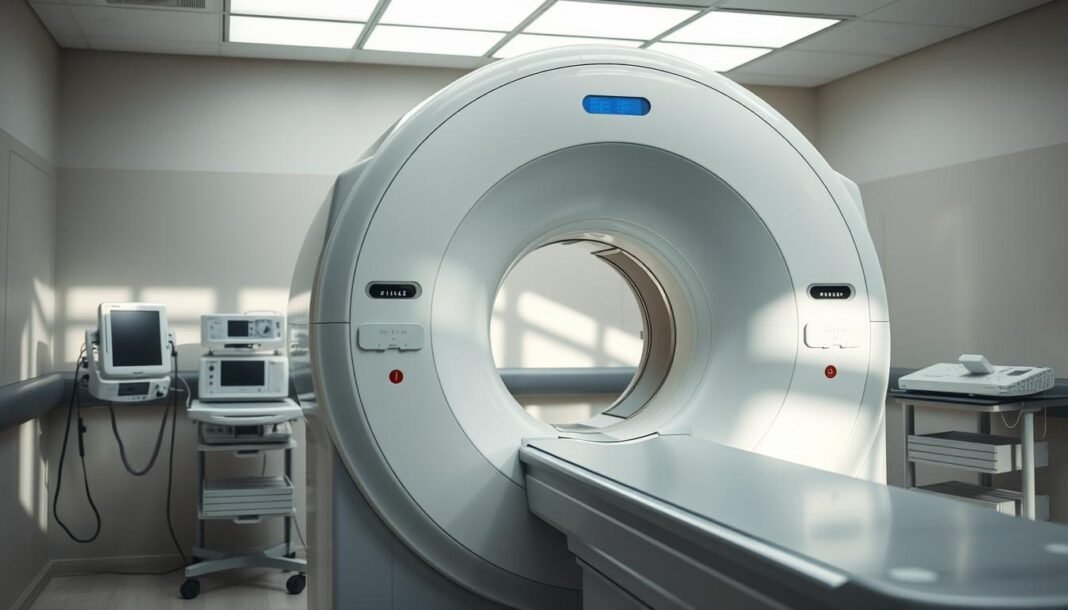MRI techs work in medical imaging. They use special equipment to take pictures inside the body.
This guide shows you how to become an MRI tech. You’ll learn about the job, schooling, and skills needed.
A modern MRI machine in a well-lit hospital room, with medical imaging equipment neatly organized nearby, emphasizing advanced technology and a sterile environment. The focus is on the sleek design of the MRI machine, showcasing its high-tech features and large opening. Subtle shadows play across the walls, highlighting the clinical setting while conveying a sense of professionalism and care.
MRI techs help doctors find health problems. They take detailed pictures that show injuries and diseases.
These scans help doctors make good treatment plans. Patients get better care because of MRI techs.
This guide is for anyone interested in medical imaging. You’ll learn what it takes to be an MRI tech.
We’ll cover education, certificates, and essential skills. This info will help you start a great career.
Understanding the Role of an MRI Technician
An MRI technician is a key player in healthcare. They run MRI machines to take detailed pictures of the body for diagnosis.
MRI technicians work closely with patients during scans. They make sure patients are comfortable and safe throughout the process.
These pros place patients on exam tables carefully. They give contrast dyes when needed and watch vital signs during scans.
MRI technicians also take care of the MRI equipment. They do quality checks and fix any problems that come up.
Their MRI tech duties include looking at the images they take. They make sure the pictures are suitable for doctors to use.
MRI technicians usually work in hospitals or imaging centers. They may have to work different shifts, including weekends and holidays.
Educational Requirements for MRI Technicians
Becoming an MRI technician needs special education and training. Most techs complete a two-year radiologic technology program.
These programs teach medical imaging basics and MRI techniques. Students also learn patient care and radiation safety.
Students get hands-on practice with MRI scanners. They learn to use equipment and position patients correctly.
Courses cover anatomy, physiology, and medical terms. Students also study the physics of MRI technology.
Graduates can take the national certification exam. The American Registry of Radiologic Technologists gives this test.
Some people may get a bachelor’s degree instead. This can lead to more job options and growth.
Special MRI training programs are also available. These last 6-12 months and focus on MRI-specific skills.
These programs are often at community colleges or hospitals. They teach MRI equipment use and patient care.
Getting Certified as an MRI Technician
Becoming a certified MRI technician is vital for your career. The ARRT offers industry-standard certification for MRI technicians.
To get certified, you must finish an accredited MRI program. You’ll also need to pass the ARRT certification exam.
The ARRT process has key steps to follow. First, graduate from an accredited MRI program.
These programs usually take about two years to finish. They give you the education and training for the exam.
After your program, apply to the ARRT. Then, take and pass the certification exam.
Keeping your ARRT certification current is crucial. You must do continuing education every two years.
This keeps you updated on new MRI tech and methods. It helps you give better care to patients.
Some states may require a special license for MRI techs. Check your state’s rules to meet all needed qualifications.
Getting certified shows your commitment to MRI work. It proves you want to give excellent patient care.
Skills Needed to Succeed as an MRI Tech
MRI techs need more than just technical skills. They must have excellent patient communication and problem-solving abilities, too.
MRI tech skills include understanding magnetic resonance imaging principles. They also involve moving patients into scanners and improving image quality.
Technical proficiency is key for MRI techs. They must operate complex machines and fix equipment issues.
Interpersonal skills are crucial for patient communication and care. MRI techs must calm patients and explain the scanning process clearly.
A collage of essential MRI tech skills featuring intricate images of MRI machines, patient care interactions, technical schematics, teamwork, attention to detail, and problem-solving elements, all set in a modern medical environment with vibrant colors and dynamic compositions.
MRI techs need strong problem-solving skills. They may face issues like patient anxiety or equipment problems.
They must analyze situations and find solutions quickly. Staying calm and professional is essential in these moments.
A mix of technical, communication, and problem-solving skills is vital. These abilities help MRI techs succeed in their healthcare career.
Finding MRI Tech Programs and Schools
Aspiring MRI technicians have many educational options. Programs range from accredited schools to online courses. Choose a program that fits your goals and schedule.
Accreditation is crucial when choosing an MRI tech program. Look for schools approved by JRCERT or other recognized bodies. This ensures quality education and meets licensing requirements.
Online MRI tech programs offer flexibility for students. Many accredited schools now provide remote coursework options. These often include hands-on clinical experiences for practical skills.
Traditional on-campus programs are available across the United States. These combine classroom learning with hands-on training. Students practice in modern medical imaging facilities.
Compare MRI tech programs carefully before deciding. Focus on accreditation and program format. Find a program that suits your needs and career goals.

Gaining Practical Experience in the Field
MRI tech internships offer hands-on experience. You’ll work with pros and learn essential skills.
Job shadowing lets you see daily tasks up close. It helps confirm your interest in this career.
Networking in healthcare is key for MRI technicians. Attend events and join associations to build relationships.
These connections can lead to job opportunities. They also provide career advice and mentorship.
Combine training, experience, and networking for success. This approach prepares you for a rewarding MRI tech career.
Job Outlook and Salary Expectations
MRI technician jobs are growing fast. The U.S. Bureau of Labor Statistics predicts a 7% growth from 2019 to 2029.
This growth is due to an aging population. More diagnostic imaging procedures are also being done.
In 2020, the median yearly salary was $73,410. Salaries vary based on location and experience.
Hospital MRI techs often earn more. They make more than those in doctor’s offices.
The job outlook for MRI technicians is good. It’s an attractive career in healthcare.
With proper education and skills, MRI techs can find great jobs. These jobs pay well in a growing field.
Advancing Your Career as an MRI Tech
MRI technicians have many chances to grow and specialize. Ongoing learning is key to unlocking your full potential.
One way to advance is by getting special certifications. You can become certified in areas like heart, breast, or muscle imaging.
You can also move into leadership roles. These include the MRI department supervisor or chief imaging technologist.
These jobs often need more education and experience. They can lead to more duties and higher pay.
Continuous learning is vital for MRI tech career growth. Attend industry events and take extra courses.
Stay updated with new imaging tech advances. This helps you expand your skills and knowledge.
Tips for Landing Your First Job as an MRI Tech
The job search for new MRI techs can be thrilling and overwhelming. Focus on these key areas to stand out in the healthcare job market.
Craft a compelling resume that highlights your technical skills and clinical experience. Tailor it to each job listing, matching your qualifications to the employer’s needs.
Include a personal statement showing your passion for MRI and patient care. This can help you stand out from other applicants.
Be ready to discuss MRI equipment, imaging procedures, and safety protocols in interviews. Practice answering questions about handling complex patients and equipment problems.
Prepare thoughtful questions for the interviewer. This shows your interest in the role and organization.
FAQ
What is the role of an MRI technician?
MRI technicians run machines that take detailed body images. They help doctors diagnose patients and provide excellent care.
What are the educational requirements for becoming an MRI technician?
MRI techs need an associate’s degree in radiologic technology. These programs teach medical imaging, patient care, and MRI equipment use.
How do I obtain certification as an MRI technician?
The ARRT is the main certifying body for MRI technicians. After school, you must pass their exam to become certified.
What skills are required to succeed as an MRI technician?
MRI techs need technical know-how and good people skills. They must run machines, read images, and talk nicely with patients.
Problem-solving skills are also crucial for fixing equipment issues.
How can I find MRI tech programs and schools?
Look for accredited programs at community colleges and universities. Online options exist for those who need flexible learning.
Make sure the program meets industry standards before enrolling.
What is the job outlook and salary range for MRI technicians?
MRI tech jobs are growing fast due to aging populations. Pay varies by location and experience, but the median salary is $73,000.
You may also read: Tech Savvy Meaning: Digital Skills Made Simple

